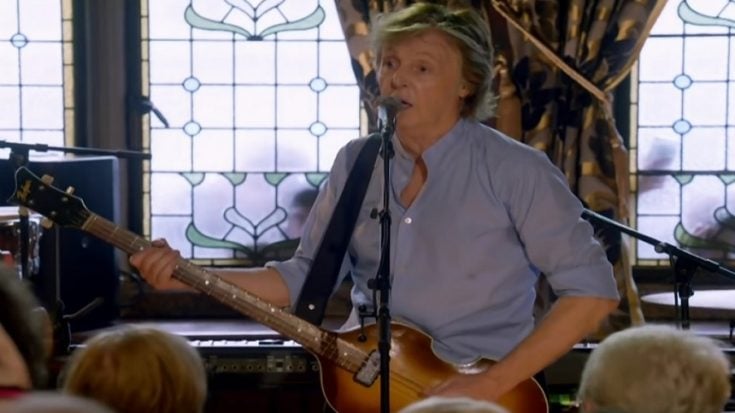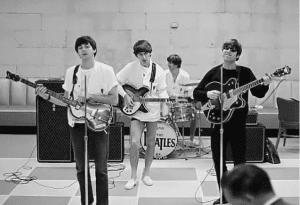The Unexpected Story How “Ob-La-Di, Ob-La-Da” Came About To Paul McCartney

Paul McCartney - The Late Late Show with James Corden / YouTube
The Beatles’ “Ob-La-Di, Ob-La-Da” is a song that has divided listeners for decades. Even within the band itself, the track caused friction. John Lennon famously dismissed it as “granny music,” highlighting its unusual style.
However, despite the initial resistance, “Ob-La-Di, Ob-La-Da” has become a beloved classic. Its infectious melody and upbeat tempo are undeniable, making it a favorite among many listeners.
The origins of this iconic song are perhaps just as surprising as its reception. In this article, we’ll delve into the unexpected story of how “Ob-La-Di, Ob-La-Da” came about for Paul McCartney, exploring the inspiration behind the song’s creation and the meaning hidden within its playful lyrics.
Desmond and Molly are fictional characters McCartney made up
In the opening verse of this Beatles classic, the song introduces Desmond, a market stall owner, and Molly, a singer. Their simple meet-cute, with Desmond complimenting Molly and her reciprocating with a touch, sets the stage for the song’s narrative.
Throughout the song, McCartney weaves together the stories of Desmond and Molly, celebrating the ordinary moments that make up their lives.
He transforms mundane activities into something vibrant and engaging, showcasing his talent for weaving narratives through song lyrics.
Interestingly, despite the vivid portrayal of these characters, they are entirely fictional. In an interview, McCartney revealed George Harrison’s surprise at his ability to create such relatable figures. He simply explained, “I make them up, like a novelist makes characters up.”
https://twitter.com/flowersmacca70s/status/1515493939154980869
An upbeat song with quirky elements and offbeat ad-libs.
As the song progresses, years pass for Desmond and Molly, and their relationship blossoms. We learn they’ve built a happy home, complete with children playing in the yard, and their new surname – Jones. The cheerful “Ha, ha, ha, ha, ha” underlines the joy of their family life.
However, even Paul McCartney’s bandmates weren’t completely sold on the song. John Lennon, known for his outspokenness, called it “fairly weird” due to its quirky elements and offbeat ad-libs.
Despite the unconventional style, the message of “Ob-La-Di, Ob-La-Da” shines through. The song’s core theme revolves around the enduring nature of life. No matter the individual experiences, life keeps moving forward, just like Desmond and Molly’s story.
The title came from a Nigerian musician and friend of Paul
The inspiration behind the iconic title of “Ob-La-Di, Ob-La-Da” came from Paul McCartney’s friendship with a London-based Nigerian musician and club patron named Jimmy Scott.
As McCartney described, he would often greet Jimmy with “What’s happening?” to which Jimmy would reply, “Ob-la-di, ob-la-da, life goes on, bra.” Struck by this positive outlook, McCartney incorporated it into the song’s title and refrain.
The lyrics reflect this optimistic philosophy: “Ob-la-di, ob-la-da / Life goes on, brah / La-la, how their life goes on.” This simple yet powerful message resonates throughout the song, celebrating the enduring nature of life and the resilience of the human spirit.
Despite the song’s uplifting theme, “Ob-la-di, ob-la-da” holds a unique place in Beatles lore. The playful lyrics, combined with the repetitive refrain, have sparked debate among fans, with some finding it catchy and others deeming it bizarre.
The song sparked some controversy
In fact, even if it was a track off the Fab Four’s iconic 1968 double album fans fondly called the White Album, some music commentators have found its lightheartedness and simplicity excessive, even landing it on “worst songs ever” lists. Interestingly, this perspective hasn’t stopped McCartney from embracing the song.
What Macca did not embrace was Jimmy Scott’s claim for songwriting credit. He argued that the phrase “Ob-la-di, ob-la-da, life goes on, bra” was not a common expression but unique to his family.
McCartney, however, maintained that it was simply a casual saying and denied any creative contribution from Scott. This disagreement caused friction with the British press, who seemingly sided with Scott.
The situation took an unexpected turn when Scott, facing legal troubles, requested the Beatles financially support his defense. McCartney agreed to cover the costs under one condition: Scott dropping his songwriting credit claim. This ultimately resolved the dispute, leaving a lasting mark on the song’s legacy.












